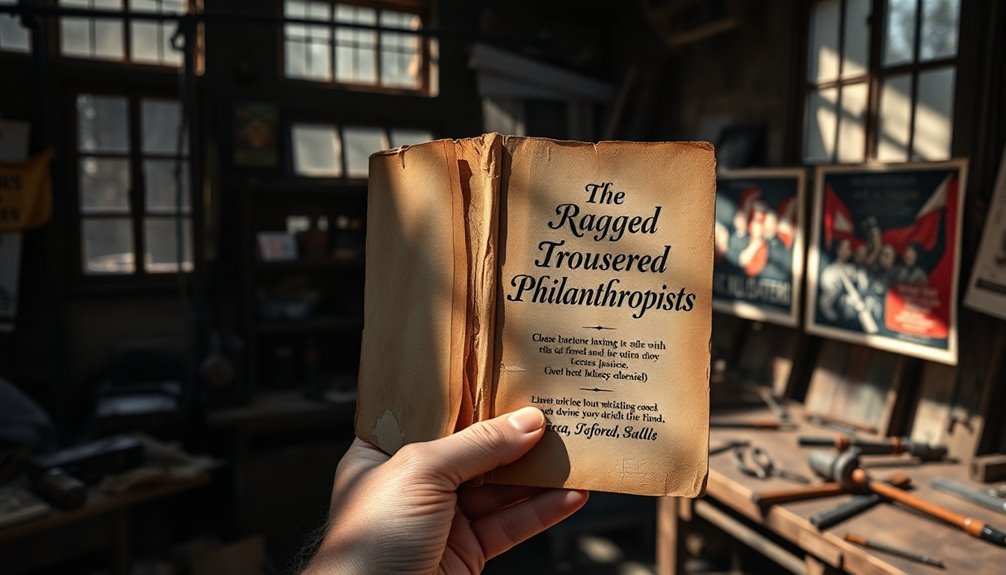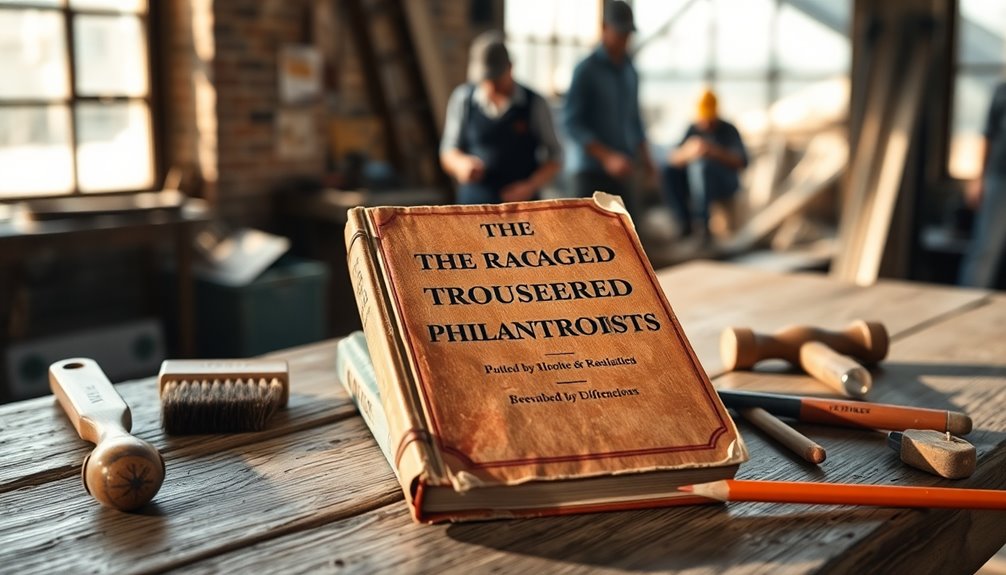"The Ragged Trousered Philanthropists" is a must-read classic that lays bare the struggles of working-class life in Edwardian England. You'll follow Frank Owen, a passionate painter, as he fights against social injustices and economic exploitation under capitalism. Authored by Robert Tressell, who experienced poverty firsthand, this novel critiques systemic oppression and emphasizes the importance of political awareness for laborers. Since its publication in 1914, it has inspired generations, contributing considerably to labor literature. The themes remain relevant today, sparking fresh discussions on class issues and workers' rights. Discover more about its lasting impact and rich history.
Overview of the Novel

"The Ragged Trousered Philanthropists," set against the backdrop of Edwardian England, dives into the struggles of working-class painters and decorators. The novel intricately portrays social injustice and the economic exploitation faced by these laborers.
Central to the story is Frank Owen, who embodies the fight for political awareness among his peers. He challenges the complacency of the working class, urging them to recognize the harsh realities of capitalism that keep them in poverty. Owen's advocacy for collective action resonates with the historical significance of resistance movements during World War II, illustrating how unity can empower the oppressed. Moreover, the narrative underscores that education serves as a crucial tool for overcoming adversity and fostering resilience among these workers.
Through a series of conversations and lectures, Owen critiques the capitalist system, exposing its hypocrisy and advocating for collective action to improve their plight. This narrative not only highlights the dire conditions of the working class but also serves as a powerful social critique, reflecting the urgent need for change.
Published in 1914 with significant omissions, the complete text emerged in 1955, solidifying its status as a cornerstone of labor literature. Its themes resonate today, inspiring ongoing discussions about class struggles and labor rights. The novel's exploration of social injustice parallels the historical injustices highlighted in works like The Immortal Life of Henrietta Lacks, reinforcing the importance of addressing systemic inequalities.
The Ragged Trousered Philanthropists remains an essential work, influencing modern political thought and movements, making it a timeless piece of social commentary.
Author's Background
Robert Tressell, born Robert Noonan on April 17, 1870, in Dublin, Ireland, brought his experiences as a painter and decorator to life in "The Ragged Trousered Philanthropists." His time spent in South Africa and subsequent move to England in 1901 exposed him to the harsh realities of working-class life, fueling his engagement with socialist politics. Tressell's personal experiences with poverty and the looming fear of workhouses for his family deeply influenced the narrative and characters within the novel. In "The Ragged Trousered Philanthropists," Tressell vividly captures the struggles of working men, using realism to highlight their daily lives and societal challenges. The manuscript faced rejection from three publishers, but Tressell's daughter, Kathleen Noonan, preserved it from destruction, ensuring his voice wouldn't be lost.
Tressell died on February 3, 1911, leaving behind a significant legacy as a key figure in early 20th-century social literature. His work not only provides insight into the political history of the time but also serves as a poignant reminder of the impact of poverty and socialism on society. Additionally, Tressell's narrative resonates with the efforts of unsung champions who advocated for social justice and equality, much like the pioneers of political movements that shaped history. His portrayal of marginalized individuals reflects how hidden heroes can influence societal change through their struggles and triumphs.
Through his writing, Tressell remains a powerful advocate for the working class. His experiences reflect the broader immigrant experience, showcasing the struggles of those navigating urban poverty and societal challenges.
Key Themes Explored

In "The Ragged Trousered Philanthropists," you'll see a stark portrayal of class struggle dynamics that highlight the exploitation inherent in capitalism.
The ethical dilemmas of the capitalist system force you to confront the harsh realities faced by the working class. In a similar vein, the characters in "The Book Thief" demonstrate acts of courage against oppressive regimes, showcasing the importance of standing up for justice. Coates' exploration of systemic racism further enriches the discussion on social justice, emphasizing the need to understand the broader implications of oppression.
This powerful critique not only challenges your perceptions but also calls for a deeper understanding of social justice and economic equality. Additionally, the novel's exploration of power and corruption resonates with themes found in historical mystery narratives like "The Daughters of Night."
Class Struggle Dynamics
In this microcosm of early 20th-century British society, the stark class distinctions resonate with you, emphasizing the urgency for collective action to break the cycle of poverty and oppression.
You're left pondering the profound implications of class struggle and the potential for change within a capitalist framework.
Capitalism's Ethical Dilemmas
Critiquing capitalism's ethical dilemmas, "The Ragged Trousered Philanthropists" reveals how the system's greed and corruption perpetuate the suffering of the working class. You witness the exploitation of characters who toil away, creating wealth for their employers while remaining trapped in poverty themselves.
Tressell's metaphor of "The Great Money Trick" highlights this Marxist surplus value theory, emphasizing how workers unknowingly sacrifice their well-being for capitalists' profit.
The narrative goes further, exposing the complacency of laborers who defend a system that oppresses them. This paradox of self-exploitation is striking, as it illustrates how easily individuals accept their suffering as the norm.
Tressell critiques charity and bureaucratic efforts, arguing they only reinforce social inequality rather than addressing the root causes of economic disparity.
Ultimately, the book serves as a rallying call for political awareness and action. It stresses the importance of solidarity and collective action among the working class to confront these ethical dilemmas posed by capitalism.
Historical Context
In "The Ragged Trousered Philanthropists," you see the stark realities of Edwardian class struggles firsthand.
Robert Tressell's experiences highlight the impact of growing socialist movements and the fight for labor rights during a time of significant social change. The novel serves as a cautionary tale about the destructive nature of bitterness and revenge, illustrating how economic disparity affects relationships and individual aspirations. The characters' experiences reflect the impact of systemic oppression faced by marginalized individuals, similar to those depicted in Richard Wright's "Native Son."
This historical backdrop not only shapes the narrative but also critiques the capitalism that fosters economic disparity, a theme still relevant today. The novel's exploration of resilience and personal growth reflects the enduring strength found in perseverance against adversity, much like the themes in Dickens' "David Copperfield."
Edwardian Class Struggles
While the early 20th century brought industrial progress, it also laid bare the harsh realities of class struggles in Edwardian England. You see, the working class faced severe poverty and exploitation, with about 60% of the population living in dire conditions. Tressell vividly illustrates these socio-economic struggles through his characters in Mugsborough, where industrialization created a sharp divide between the wealthy and the workers.
As capitalism flourished, workers fought for fair wages and decent working conditions, often meeting resistance from their employers. The rise of socialist movements during this period highlighted the urgent need for change, advocating for the rights of the working class. Many laborers lived in constant fear of eviction and starvation, haunted by the threat of the workhouse.
Tressell's portrayal reflects the grim realities of life for these workers, emphasizing the exploitation they endured. His narrative serves as a powerful reminder of the struggles faced by everyday people during this tumultuous time.
The challenges of Edwardian England resonate today, reminding us of the importance of advocating for social justice and equitable working conditions for all.
Influence of Socialism
Exploring the impact of socialism during the early 20th century reveals a powerful undercurrent that shaped the lives of workers in Britain. "The Ragged Trousered Philanthropists" captures this zeitgeist, presenting a vivid picture of the socialist movement's rise and its call for social equity.
In the novel, Frank Owen embodies the struggle for workers' rights, urging his fellow laborers to cultivate political awareness to challenge systemic oppression and poverty. Tressell critiques the complacency that often accompanies capitalist exploitation, positioning socialism as a means to reclaim dignity and prioritize communal needs over profit.
Through the lens of the "Great Money Trick," Tressell illustrates Marxist surplus value theory, reinforcing the idea that laborers deserve the fruits of their work. This critical perspective not only enriches the narrative but also contributes to the broader socialist discourse of the time.
The themes in "The Ragged Trousered Philanthropists" resonate with historical socialist thought, influencing notable political figures like Jeremy Corbyn, who recognized its role in shaping modern labor movements and discussions on social justice.
Ultimately, the novel stands as a powerful demonstration of the enduring relevance of socialism in the fight for equity.
Reception and Impact

"The Ragged Trousered Philanthropists" has garnered significant acclaim since its release, boasting a remarkable rating of 4.04 out of 5 from nearly 10,000 readers. This enduring relevance speaks volumes about its impact on discussions around working-class struggles and capitalism. Notable figures like George Orwell have praised the novel as essential reading, emphasizing its significance in understanding socialist thought and the political history of class struggles.
Since its publication in 1914, the book has sold over one million copies, reflecting its significant role in shaping conversations about social justice. Its cultural impact extends beyond literature, with adaptations like a graphic novel that was nominated for a 2022 Eisner Award, demonstrating how the Ragged Trousered Philanthropists resonate with contemporary audiences. Additionally, the book's exploration of the systemic inequalities inherent in capitalist societies offers valuable insights into the historical context of class struggles that continue to be relevant today. The themes presented in the novel align with the principles of mental health that emphasize the importance of resilience and self-awareness in addressing societal issues.
Moreover, the novel continues to influence modern political discourse, as contemporary political figures often reference its themes, highlighting its relevance in today's labor movements. By addressing the systemic inequalities of capitalism, the book remains a crucial source of inspiration for those advocating for social change. This aligns with the idea that embracing a growth mindset can foster resilience and perseverance in overcoming the challenges presented by such inequalities.
Adaptations Across Media
Adaptations of "The Ragged Trousered Philanthropists" have breathed new life into Robert Tressell's powerful narrative, allowing it to reach diverse audiences across various platforms.
These adaptations not only preserve the essence of Tressell's work but also enhance cultural understanding of working-class struggles.
- The graphic novel adaptation by Scarlett and Sophie Rickard, published in 2020 (UK) and 2021 (US), was nominated for Best Adaptation at the 2022 Eisner Awards.
- The first stage adaptation, directed by William Gaskill, premiered in 1978, leading to various interpretations, including Howard Brenton's version in 2010.
- BBC Radio 4 produced notable adaptations, with a star-studded 2008 version and a six-part series from 1989.
- Documentaries like "Shut Out The Light" (2014) explore Robert Tressell's life and the novel's significance, broadening its impact.
- The novel's translation into multiple languages and sales of over one million copies highlight its enduring relevance and the importance of its adaptations.
These various forms guarantee that the Ragged Trousered Philanthropists remains a significant part of working-class literature for generations to come.
Relevance Today

In today's world, "The Ragged Trousered Philanthropists" still strikes a chord, offering a piercing critique of capitalism and shedding light on ongoing struggles faced by the working class. Its exploration of poverty and social inequality resonates deeply in our modern society, where economic disparity and corporate greed continue to grow.
This novel highlights the importance of social justice and political awareness, themes that have inspired contemporary labor movements and discussions about workers' rights. As you read, you might notice how the narrative's call for solidarity among the working class serves as a rallying cry for those fighting against the injustices they face today.
The book's enduring appeal is evident, with a current rating of 4.04 out of 5 based on nearly 10,000 ratings, showcasing its relevance across generations. Political figures like Jeremy Corbyn reference the Ragged Trousered Philanthropists in discussions about class and systemic change, further solidifying its impact in current discourse.
In a time when many grapple with the consequences of capitalism, this classic remains an essential text, encouraging you to reflect on the conditions of the working class and the fight for a fairer society.
Conclusion
To sum up, "The Ragged Trousered Philanthropists" remains a powerful reflection of the struggles of the working class. Did you know that nearly 60% of workers in the UK still feel undervalued and underpaid? This statistic underscores the novel's enduring relevance, reminding us that the fight for workers' rights and dignity continues today. By exploring the themes in this classic, you're not just engaging with literature; you're connecting with a crucial social movement that resonates even now.



